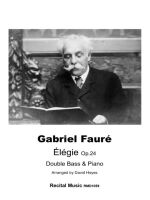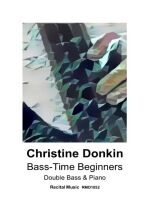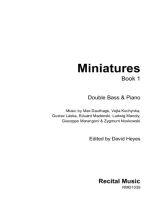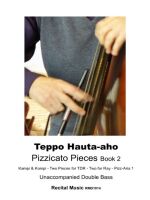Celebrations Book 7
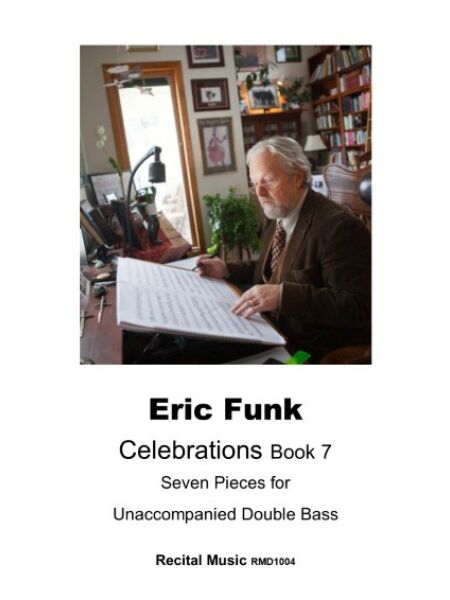
Product code:
£10.00
Description
Celebrations Book 7 brings together seven exciting, evocative and inventive works for unaccompanied double bass by American composer Eric Funk. Composed over the past few years each piece celebrates a specific bassist, commemoration, or anniversary, and all are aimed at the adventurous intermediate bassist.
Eric Funk has composed a number of works for double bass and each work is beautifully crafted until every musical detail and nuance is perfect. None outstay their welcome, and each piece offers musical and technical challenges in equal measure written in a contemporary but accessible and approachable idiom.
1. Trochu Rondo Op.141 – composed for Pošta 100 to commemorate the centenary of the birth of František Pošta in 2019.
“Trochu” is a Czech word that means “little” in English. This “little rondo” was composed in memory of the famous Czech double bassist and teacher František Pošta.
Trochu Rondo was premiered on Saturday 1 April 2017 at the Church of Saint Mary, West Harptree (Somerset) by David Heyes.
2. Aria was composed in 2017, having originally been commissioned for Teppo-Fest a year earlier, but delayed because of illness. Based on a poem by Finnish poet Jouni Inkala, the musical line follows the English translation, word for word, in a free flowing and elegant soliloquy. Atmospheric and evocative, there are elements of dramatic tension and passion, contrasting phrases of a more lyrical and cantabile nature. The occasional pizzicato notes ground the piece, varying the colour and texture, and it ends slowly and quietly with a short coda-like phrase with an eerily atmospheric sul ponticello effect. Aria is marked ‘contemplative, inward turned’ with music of a spare and ethereal nature.
3. Now Cracks the Noble Heart Good Night, sweet prince: And flights of angels sing thee to thy rest (written in memory of Tony Osborne). Tony Osborne was an English composer and double bassist whose music revealed his fine sense of humour a complex intellect. I never met him but felt I had a sense of him through his music. The title of this short piece, taken from Shakespeare’s “Hamlet”, acknowledges the complex person I sense Tony Osborne was and quietly honours his meaningful life and passing.
4. Self-Portrait: Eric D F
This short piece was written as part of David Heyes’ ‘Self Portrait Project’. As composers like Johann Sebastian Bach, Dimitri Shostakovich, and Alfred Schnittke used their initials (using the German musical alphabet to create musical monograms (B-A-C-H, D-A-S-H, and A-F-E- D S-C-H, respectively), I used a similar approach using E-Ri (D#)-C -D (for Douglas)- F (for Funk). I gave some thought to having rests represent the letters in my full name for which there aren’t pitch names but opted not to do so. I did quietly include, for fun, my middle name in measure 4, Douglas, with D/moveable ‘do’-G, and two As [as LAs in solfeggio]; i.e. Do-g- las. Over the course of the last number of years I’ve composed a number of pieces for double bass at the request of my friend David Heyes. When I surveyed the music I had created for each piece, I noticed certain intervallic, rhythmic, and lyrical gestures that capture a fair portrait of my musical voice reflected in these solo bass works. This Self Portrait mirrors that writing and the feeling tone of particularly the 2nd movement of the double bass concerto I composed for David years ago, a piece which he brilliantly premiered in America with orchestra and at the International Bass-Fest in Dorset with Mark Cracknell in the piano reduction version. When I compose for double bass, I am hearing David’s sound mixed with my inspiration.
5. Retrospective Glance – composed to celebrate the 85th birthday of the legendary American bassist Bert Turetzky As time passes, as we age, we sometimes stop intentionally to recall, to look back over our life, to take a retrospective glance of our lifetime. Prominent memories arise along with feelings, sometimes with over-arching “flavours” of time and place, sounds-smells-feeling tones. I believe this nostalgia also carries with it a certain hope that the fabric of our time on earth is laced with certain positive impacts on others. As musicians, many of these remembrances carry recollections of when we touched the hearts and imaginations of those listening to the music we’ve created, commissioned, and performed. It’s a very private thing, this retrospective glance. Sometimes it underpins our view of our life as having had a certain value, hopefully carrying our character and integrity, and, ideally, affording a sense of a life well-lived. Life is so beautiful, when reviewed from older age.
6. nalVurtlV Op.151 – composed for Da Vinci 500 (2019)
It’s an unusual piece, using a little Golden Ration and Fibonacci Sequence and even a couple of rhythmically modified musical phrases Da Vinci himself composed. The title looks quite strange but, because Leonardo was so into mirror writing and hiding things in his paintings, I thought it fun to create a title that was obscure, but if you look closely and use retrograde, you will see that the two Roman numeral fours are the letters “v” and “I” backwards, the title then, read backwards, being “Vitruvian”. Since another American composer used Vitruvian for his piece, beating me to the punch, I decided to be a bit cryptic and playful with this.
nalVurtlV was premiered by David Heyes (double bass) on Thursday 2 May 2019 at Silk Mill West, Frome, Somerset.
7. Syrinx’s Century-Late Echo – composed for The Syrinx Project (2018) This short piece is a “response” to Debussy’s well-known solo flute work “Syrinx”. The piece was composed at the request of internationally known double bassist, David Heyes, as part of a project acknowledging the 100th anniversary of Debussy’s death (2018).
As a 15-year old school student, my school music program had an inordinate number of very fine flautists, the four top players having formed a flute quartet well-known throughout the Northwestern United States music scene. All these young women, at some time, played “Syrinx” as a contest piece. I heard it so many times during my young years that I nearly have it memorized. I found it interesting to write a piece in homage to Debussy and, particularly, Syrinx, for the double bass, an instrument at the lowest end of the musical staff, in contrast to the flute, an instrument at the highest end. To that end, I rather reversed the direction of Debussy’s opening motive and created at least the gesture of an ascending line in contrast to his descending line. But my central purpose was to capture the mythic ethos I felt Debussy created with his music depicting the nymph from classical Greek mythology at the river’s edge seeking assistance from the river nymphs. In answer to her plea, she was turned into hollow water reeds that made a haunting sound when god’s frustrated breath blew across them. Pan cut the reeds to make his Pan Pipes, from that point forward known as syrinx. My title suggests Syrinx “voice” is now echoed back through the air from a more “centre of the earth” instrument, the double bass. It is composed to act as an answer to her questioning voice.
Description
Celebrations Book 7 brings together seven exciting, evocative and inventive works for unaccompanied double bass by American composer Eric Funk. Composed over the past few years each piece celebrates a specific bassist, commemoration, or anniversary, and all are aimed at the adventurous intermediate bassist.
Eric Funk has composed a number of works for double bass and each work is beautifully crafted until every musical detail and nuance is perfect. None outstay their welcome, and each piece offers musical and technical challenges in equal measure written in a contemporary but accessible and approachable idiom.
1. Trochu Rondo Op.141 – composed for Pošta 100 to commemorate the centenary of the birth of František Pošta in 2019.
“Trochu” is a Czech word that means “little” in English. This “little rondo” was composed in memory of the famous Czech double bassist and teacher František Pošta.
Trochu Rondo was premiered on Saturday 1 April 2017 at the Church of Saint Mary, West Harptree (Somerset) by David Heyes.
2. Aria was composed in 2017, having originally been commissioned for Teppo-Fest a year earlier, but delayed because of illness. Based on a poem by Finnish poet Jouni Inkala, the musical line follows the English translation, word for word, in a free flowing and elegant soliloquy. Atmospheric and evocative, there are elements of dramatic tension and passion, contrasting phrases of a more lyrical and cantabile nature. The occasional pizzicato notes ground the piece, varying the colour and texture, and it ends slowly and quietly with a short coda-like phrase with an eerily atmospheric sul ponticello effect. Aria is marked ‘contemplative, inward turned’ with music of a spare and ethereal nature.
3. Now Cracks the Noble Heart Good Night, sweet prince: And flights of angels sing thee to thy rest (written in memory of Tony Osborne). Tony Osborne was an English composer and double bassist whose music revealed his fine sense of humour a complex intellect. I never met him but felt I had a sense of him through his music. The title of this short piece, taken from Shakespeare’s “Hamlet”, acknowledges the complex person I sense Tony Osborne was and quietly honours his meaningful life and passing.
4. Self-Portrait: Eric D F
This short piece was written as part of David Heyes’ ‘Self Portrait Project’. As composers like Johann Sebastian Bach, Dimitri Shostakovich, and Alfred Schnittke used their initials (using the German musical alphabet to create musical monograms (B-A-C-H, D-A-S-H, and A-F-E- D S-C-H, respectively), I used a similar approach using E-Ri (D#)-C -D (for Douglas)- F (for Funk). I gave some thought to having rests represent the letters in my full name for which there aren’t pitch names but opted not to do so. I did quietly include, for fun, my middle name in measure 4, Douglas, with D/moveable ‘do’-G, and two As [as LAs in solfeggio]; i.e. Do-g- las. Over the course of the last number of years I’ve composed a number of pieces for double bass at the request of my friend David Heyes. When I surveyed the music I had created for each piece, I noticed certain intervallic, rhythmic, and lyrical gestures that capture a fair portrait of my musical voice reflected in these solo bass works. This Self Portrait mirrors that writing and the feeling tone of particularly the 2nd movement of the double bass concerto I composed for David years ago, a piece which he brilliantly premiered in America with orchestra and at the International Bass-Fest in Dorset with Mark Cracknell in the piano reduction version. When I compose for double bass, I am hearing David’s sound mixed with my inspiration.
5. Retrospective Glance – composed to celebrate the 85th birthday of the legendary American bassist Bert Turetzky As time passes, as we age, we sometimes stop intentionally to recall, to look back over our life, to take a retrospective glance of our lifetime. Prominent memories arise along with feelings, sometimes with over-arching “flavours” of time and place, sounds-smells-feeling tones. I believe this nostalgia also carries with it a certain hope that the fabric of our time on earth is laced with certain positive impacts on others. As musicians, many of these remembrances carry recollections of when we touched the hearts and imaginations of those listening to the music we’ve created, commissioned, and performed. It’s a very private thing, this retrospective glance. Sometimes it underpins our view of our life as having had a certain value, hopefully carrying our character and integrity, and, ideally, affording a sense of a life well-lived. Life is so beautiful, when reviewed from older age.
6. nalVurtlV Op.151 – composed for Da Vinci 500 (2019)
It’s an unusual piece, using a little Golden Ration and Fibonacci Sequence and even a couple of rhythmically modified musical phrases Da Vinci himself composed. The title looks quite strange but, because Leonardo was so into mirror writing and hiding things in his paintings, I thought it fun to create a title that was obscure, but if you look closely and use retrograde, you will see that the two Roman numeral fours are the letters “v” and “I” backwards, the title then, read backwards, being “Vitruvian”. Since another American composer used Vitruvian for his piece, beating me to the punch, I decided to be a bit cryptic and playful with this.
nalVurtlV was premiered by David Heyes (double bass) on Thursday 2 May 2019 at Silk Mill West, Frome, Somerset.
7. Syrinx’s Century-Late Echo – composed for The Syrinx Project (2018) This short piece is a “response” to Debussy’s well-known solo flute work “Syrinx”. The piece was composed at the request of internationally known double bassist, David Heyes, as part of a project acknowledging the 100th anniversary of Debussy’s death (2018).
As a 15-year old school student, my school music program had an inordinate number of very fine flautists, the four top players having formed a flute quartet well-known throughout the Northwestern United States music scene. All these young women, at some time, played “Syrinx” as a contest piece. I heard it so many times during my young years that I nearly have it memorized. I found it interesting to write a piece in homage to Debussy and, particularly, Syrinx, for the double bass, an instrument at the lowest end of the musical staff, in contrast to the flute, an instrument at the highest end. To that end, I rather reversed the direction of Debussy’s opening motive and created at least the gesture of an ascending line in contrast to his descending line. But my central purpose was to capture the mythic ethos I felt Debussy created with his music depicting the nymph from classical Greek mythology at the river’s edge seeking assistance from the river nymphs. In answer to her plea, she was turned into hollow water reeds that made a haunting sound when god’s frustrated breath blew across them. Pan cut the reeds to make his Pan Pipes, from that point forward known as syrinx. My title suggests Syrinx “voice” is now echoed back through the air from a more “centre of the earth” instrument, the double bass. It is composed to act as an answer to her questioning voice.
